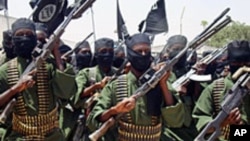A few days ago, the Somali insurgent group al-Shabab announced a surprise withdrawal from the capital, Mogadishu. The group said its decision was a “tactical move” that would allow it to redeploy fighters to other parts of the country. But the transitional federal government, whose power is mostly confined to the capital, says the retreat is a defeat for the al-qaeda linked group.
The sudden withdrawal from Mogadishu has many observers speculating about the change in strategy.
Ken Menkhaus, a professor of political science at Davidson College in North Carolina, said “there are competing interpretations right now. Some claim it’s a result of the defeat of al-Shabab at the hands of the offensive by the AU force and TFG and other militia…”
Others say the withdrawal is a ploy to take the battle to more advantageous ground outside the city. This, they say, would make the AU and aid agencies more vulnerable to attacks.
“There is no guarantee,” said Menkhaus, “that al-Shabab has not held back some [of its] operatives who will engage in assassination attempts and other attacks designed to stall the relief agencies.”
Menkhaus says the group could be changing strategy to a more effective “symmetrical urban guerilla warfare.”
This entails shifting forces to the south where they can get assistance. Earlier offensives by AU forces had pushed al-Shabab from the popular Bakara Market which many consider to be the nerve center of Somali business. According to Menkhaus, the loss dealt a blow the group because the market was a major source of revenue for the insurgents.
Others speculate divisions within al-Shabab’s leadership are responsible for the weakening of the group. Earlier reports of a widening rift between key militia leaders are said to have been the reason for the continued survival for the embattled Transitional Federal Government which was operating from within the AU forces compound.
Menkhaus said the group is divided on strategy and has taken a beating as a result of its handling of the famine.
The withdrawal has taken pressure off of African Union forces, allowing them to expand their area of control in the capital. Aid agencies also see this as an opportunity to reach more people affected by the famine.




